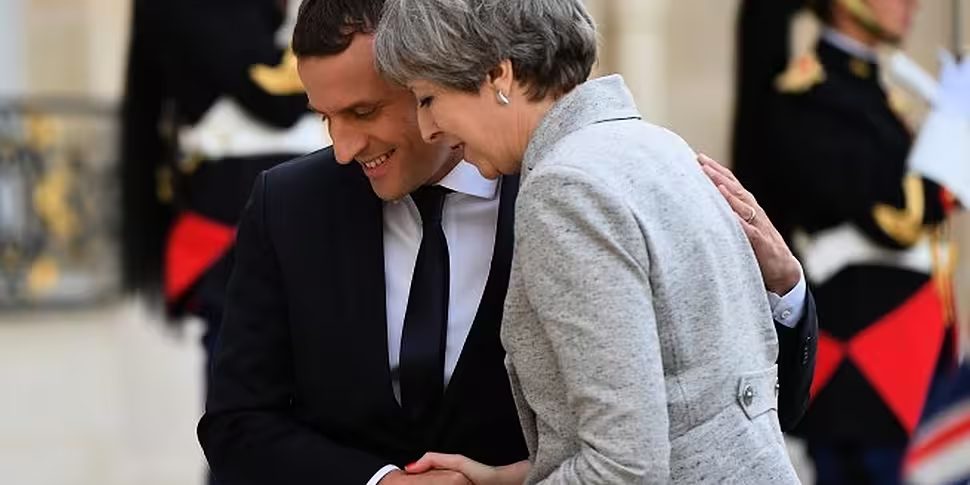The scoreline finished France 3 - England 2 in a match watched by both Emmanuel Macron and Theresa May in Paris last night, but you could argue the French victory in the preceding political meeting was even more clear cut.
As the under-fire British PM insisted that she would not need extra time to negotiate Brexit, the newly-elected French president cheekily left the door open for the Brexit idea to be dropped altogether.
May had stated at the Elysee Palace news conference:
"I confirmed to President Macron that the timetable for the Brexit negotiation remains on course and will begin next week."
Macron, however, subtly sowed seeds of public doubt, adding:
"Of course the door remains open, always open, until the Brexit negotiations come to an end."

Theresa May and Emmanuel Macron. French President Emmanuel Macron and Prime Minister of the United Kingdom Theresa May during a press conference in the garden of Elysee Palace. Paris, France on June 13, 2017. Photo by Christian Liewig/abacapress.com
May's predecessor David Cameron, meanwhile, had claimed in Poland that there would be "pressure for a softer Brexit" and that Westminster now "deserves a say" on the issue.
"It's going to be difficult, there's no doubt about that, but perhaps an opportunity to consult more widely with the other parties on how best we can achieve it," he said.
'Hard Brexit is the only option'
The extreme difficulty of a soft Brexit coming to pass was underlined by CheckRisk's Nick Bullman on Breakfast Business this morning.
Bullman, a key observer of politics and economics in both countries, joked that he suspected "Theresa was choking over the appetiser" at their dinner and that "the agenda for Europe is marching on no matter what."
The word he's hearing from Brussels is that a hard Brexit is very much on.
"At country level they've decided a hard Brexit is the only option..." he said. "And certainly Michel Barnier, who's leading the negotiations on behalf of the EU, has decided it's going to be a hard Brexit.
"The simple reason for that the risk of contagion in Europe is greater than the risk of shooting themselves in the foot economically short-term. And Europe tends to make political decisions ahead of economic decision and therefore hard Brexit is the route."

Bullman also dismissed the notion that the strong mandate Macron and his En Marche party have secured would allow the 39-year-old to go easy on Britain.
"There's a two-edged sword here, he explained. "Firstly, if you win an absolute majority in the national assembly as he has, you've got nowhere to hide.
"So conversely politicians would like to have a little bit of opposition because that means if their programme fails at any point, they've got something to blame.
"Macron doesn't have that. He's on a new mandate, the French will push him forward and it's just a question of when does he run into the inevitable problem in France which is labour laws."
German pressure
He also saw pressure coming from Germany on the issue, as he requires a "little bit of leeway" fiscally from their easterly neighbour to get the French economy going again:
"He is indebted to Germany because Merkel has made it very clear that they will give him a little bit of space on the budget and he really needs that. He'll need that for the next two or three years...
"The quid pro quo of that is that he will have to support Germany on hard Brexit. So I don't think the French are incentivised at all to have a soft Brexit or to negotiate anything of the sort with regard to the UK on that."

As to why German chancellor Angela Merkel will be so insistent on the UK being punished, Bullman concluded:
"The reason for the Germans being so intransigent on this is really quite simple at the end of the day.
"They recognise that the biggest existential risk for Europe is a successful exit for the UK... Remember, so far the UK economy's been steaming ahead, sterling's been very weak [and] that's been a huge impetus to export companies, the UK economy looks pretty good.
"If the UK leaves Europe under a positive note – in other words, the economy booming, unemployment at low levels – then it presents an existential risk and that would cost the Germans a fortune to put right.
"There are plenty waiting in the wings: Italy, Denmark, Holland... A lot of people observing how Brexit takes place...
"This isn't conjecture, I've heard this from politicians in off-the-record comments: the biggest problem is contagion risk in Europe."









